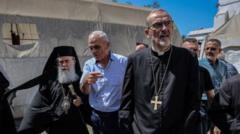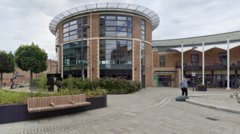What Did Church Leaders Discover During Their Heart-Wrenching Visit to Gaza?

Understanding the Humanitarian Crisis in Gaza Through the Eyes of Church Leaders
The ongoing conflict in Gaza has brought immense suffering, as witnessed by church leaders who recently returned from the war-torn region with profound anguish. Their firsthand accounts reveal a humanitarian disaster that transcends religious boundaries, emphasizing the urgent need for international attention and action. The Latin Patriarch, Cardinal Pierbattista Pizzaballa, and the Greek Orthodox Patriarch, Theophilos III, have described their experiences, shedding light on the plight of civilians caught in the crossfire. Their message is clear: the conditions in Gaza are morally unacceptable, and immediate intervention is necessary to alleviate the suffering of its people.
The Plight of Gaza’s Innocent Civilians
During their visit, the church leaders observed scenes of desperation. Cardinal Pizzaballa recounted witnessing men waiting for hours in the scorching sun, hoping for a simple meal. Children, accustomed to the sounds of bombings, seemed unfazed by the chaos surrounding them. This normalization of violence illustrates the psychological toll the conflict has taken on the younger generation, raising concerns about their future.
The stark reality is that the people of Gaza are enduring not just physical suffering but also emotional and psychological trauma. The church leaders emphasized that the humanitarian crisis extends beyond the Christian community, affecting all civilians regardless of their faith. With thousands having lost their lives, the urgency of the situation cannot be overstated.
Church Leaders’ Solidarity with the People of Gaza
In a powerful show of solidarity, both church leaders expressed their commitment to standing with the people of Gaza. Pizzaballa highlighted that Christians in the region are experiencing the same hardships as their Muslim neighbors. The statement reinforces the idea that humanity must unite in the face of adversity, transcending religious divisions to advocate for peace and justice.
Recent Violence and Attacks on Religious Sites
One of the catalysts for the church leaders' visit was a tragic incident involving Israeli tank fire that struck the Catholic Holy Family Church in Gaza City, resulting in multiple casualties. This incident not only highlights the dangers faced by civilians but also raises questions about the protection of religious sites during conflicts. The leaders condemned the violence and called for accountability, insisting that the sanctity of places of worship must be respected, irrespective of the ongoing conflict.
The Role of International Leaders in Addressing the Crisis
The involvement of international leaders, including U.S. President Donald Trump, underscores the global implications of the conflict. Reports of Trump expressing his concerns to Israeli Prime Minister Benjamin Netanyahu about the deadly strike signify the attention this issue is garnering on the world stage. However, while such conversations are essential, tangible actions are necessary to bring about lasting change in the region.
The Humanitarian Aid Dilemma
Despite the Italian foreign ministry's announcement of aid entering Gaza, the church leaders lamented that no actual supplies had yet reached those in desperate need due to logistical issues. The disappointment felt by the people waiting for assistance is palpable, highlighting the challenges of delivering aid in a conflict zone. As conditions worsen, the urgency to find solutions becomes increasingly critical.
Voices from the Ground: Testimonies of Suffering
During their visit, Pizzaballa and Theophilos III encountered individuals whose lives have been shattered by the ongoing violence. Many families have lost their homes, with makeshift tents now serving as their only refuge. The leaders described walking through the dust of ruins, witnessing firsthand the widespread destruction that has become a common sight in Gaza. The resilience of the people, however, shines through as they strive to maintain hope amidst despair.
Settler Violence and Its Impact on Local Communities
The church leaders also addressed the violence perpetrated by extremist settlers in the West Bank, particularly in the village of Taybeh. Incidents of harassment and land seizures have intensified, further complicating the already dire situation for local residents. The testimonies from villagers reveal a growing fear for their safety and livelihoods as they face increasing aggression from settlers.
International Responses and Calls for Action
In response to the violence, U.S. Ambassador to Israel, Mike Huckabee, condemned the attacks on religious sites, labeling them as "acts of terror." His strong statements emphasize the need for accountability and justice for those affected by the ongoing conflict. However, the challenge remains: how can the international community effectively intervene to protect civilians and promote peace?
Preserving the Christian Presence in the Holy Land
One of the significant concerns raised by the church leaders is the preservation of the Christian community in Gaza and the surrounding regions. As conditions become increasingly untenable, many fear that the Christian presence will diminish. The leaders called for support to ensure that the Christian community can remain close to their holy sites, which are integral to their identity and heritage.
Calls for Ceasefire and Peace Initiatives
Throughout their visit, Pizzaballa and Theophilos III reiterated the pressing need for a ceasefire in Gaza. Their calls for peace echo those of Pope Leo and numerous international leaders who urge for an end to hostilities and the release of hostages held by Hamas. The emphasis on dialogue and reconciliation highlights a path forward, one that prioritizes humanity over conflict.
The Ethical Responsibility of Global Citizens
As the world watches the developments in Gaza, there is an ethical responsibility for individuals to advocate for the rights of those suffering. The church leaders' poignant messages serve as a reminder that the lives of civilians should not be overshadowed by geopolitical interests. It is crucial for global citizens to remain informed and engaged, pushing for humanitarian solutions that prioritize the dignity and welfare of all individuals.
Frequently Asked Questions
What are the main humanitarian challenges faced by the people of Gaza?
The people of Gaza face numerous humanitarian challenges, including food shortages, lack of medical supplies, destruction of infrastructure, and psychological trauma due to ongoing violence. These challenges are exacerbated by the blockade and limited access to humanitarian aid.
How can the international community help address the crisis in Gaza?
The international community can help by advocating for ceasefires, supporting humanitarian aid efforts, engaging in diplomatic dialogue, and holding parties accountable for violations of human rights. Active involvement from global leaders and organizations is essential for creating lasting change.
What role do church leaders play in the humanitarian crisis?
Church leaders play a crucial role in advocating for peace, providing humanitarian assistance, and raising awareness about the plight of civilians. Their voices can unite communities and encourage interfaith dialogue, fostering understanding and compassion amidst conflict.
Why is it important to preserve the Christian community in the Holy Land?
Preserving the Christian community in the Holy Land is vital for maintaining the cultural and historical richness of the region. Their presence contributes to the diversity of religious beliefs and practices, fostering a sense of coexistence and mutual respect among different faiths.
What can individuals do to support the people of Gaza?
Individuals can support the people of Gaza by donating to reputable humanitarian organizations, raising awareness about the crisis, advocating for policy changes, and promoting peace initiatives. Engaging in discussions and educating others can also contribute to a greater understanding of the situation.
As we reflect on the harrowing experiences shared by the church leaders, the question remains: how can we, as global citizens, take action to support those suffering in Gaza and promote a lasting peace? The time to act is now, and every effort counts. #GazaCrisis #HumanRights #PeaceForAll
Published: 2025-07-23 10:14:05 | Category: technology



